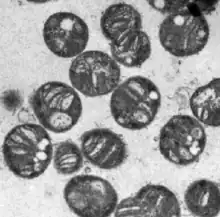Methylococcus capsulatus
Methylococcus capsulatus is an obligately methanotrophic gram-negative, non-motile coccoid bacterium. M. capsulatus are thermotolerant; their cells are encapsulated and tend to have a diplococcoid shape. In addition to methane, M. capsulatus is able to oxidize some organic hydrogen containing compounds such as methanol. It has been used commercially to produce animal feed from natural gas.[1][2]
| Methylococcus capsulatus | |
|---|---|
 | |
| Scientific classification | |
| Domain: | |
| Phylum: | |
| Class: | |
| Order: | |
| Family: | |
| Genus: | Methylococcus |
| Species: | M. capsulatus |
| Binomial name | |
| Methylococcus capsulatus Foster and Davis 1966 (Approved Lists 1980) | |
Metabolism and genetics
Methylococcus capsulatus is a Type I methanotroph, meaning that it is a member of the Gammaproteobacteria and that it utilizes the ribulose monophosphate pathway (RuMP) for formaldehyde assimilation. Methane is first oxidized to methanol, which then gets converted into formaldehyde. Formaldehyde can then be (1) further oxidized to formate and carbon dioxide for energy production or (2) assimilated into biomass.
Various strains of M. capsulatus have been isolated and studied, particularly M. capsulatus (Bath), M. capsulatus (Texas) and M. capsulatus (Aberdeen).
The genome sequence of M. capsulatus (Bath) is available.[3]
Growth requirements
M. capsulatus has also been demonstrated to be thermotolerant – that is, it can grow well up to 50 °C, though its optimum growth temperature is 37 °C.[4] In addition, M. capsulatus can live in conditions in which there is little molecular oxygen available.
Commercial use
In 1999, Norferm a subsidiary of the Norwegian oil company Statoil, opened a 10,000 tons per year plant to produce animal feed from natural gas from M. capsulatus[1] in Tjeldbergodden, Norway.[5] The plant was shut down in 2006 because of low animal feed prices, the product had not yet been approved by the EU[2] and high natural gas prices.[6]
In 2016 Calysta, an American biotech company, opened a plant in Teesside, UK, to produce up to 100 tons of fish feed a year from natural gas using M. capsulatus.[2] The company also announced plans to build a similar plant in Memphis, Tennessee[7] with an eventual capacity of 200,000 ton a year with the agricultural business company Cargill.[2][8] Another company, Unibio, also opened a plant to produce animal feed from natural gas in 2016 with a capacity of 80 tons per year using M. capsulatus in Kalundborg, Denmark.[9] In 2018 a licensee of Unibio constructed an industrial scale plant in Ivangorod, Russia close to the border of Estonia. The plant has a capacity of 6,000 tonnes of protein per year.[10]
References
- "Natures Value Chain" (PDF). Biiomass Production. Norferm. Archived from the original (PDF) on 2019-08-02. Retrieved 2016-12-12.
- Le Page, Michael (19 November 2016). "Food made from natural gas will soon feed farm animals – and us". New Scientist. Retrieved 11 December 2016.
- Ward, Naomi; Larsen, ØIvind; Sakwa, James; Bruseth, Live; Khouri, Hoda; Durkin, A. Scott; Dimitrov, George; Jiang, Lingxia; et al. (2004). "Genomic insights into methanotrophy: The complete genome sequence of Methylococcus capsulatus (Bath)". PLOS Biology. 2 (10): e303. doi:10.1371/journal.pbio.0020303. PMC 517821. PMID 15383840.
- Foster, J.; Davis, Richard (May 1966). "A Methane-Dependent Coccus, with Notes on Classification and Nomenclature of Obligate, Methane-Utilizing Bacteria". Journal of Bacteriology. 91 (5): 1924–1931. doi:10.1128/JB.91.5.1924-1931.1966. ISSN 0021-9193. PMC 316146. PMID 5937247.
- "Bioprotein begins". Statoil. 17 February 1999. Retrieved 12 December 2016.
- Fletcher, Rob (10 July 2015). "Making a meal out of methane". Fish Farming Expert. Norsk Fiskeoppdrett AS. Retrieved 12 December 2016.
- Lane, Jim (4 December 2016). "Going to Graceland: Cargill, Calysta select Tennessee for methane-to-feed project". Biofuels Digest. Retrieved 13 December 2016.
- "New venture selects Cargill's Tennessee site to produce Calysta FeedKind® Protein" (Press release). Calysta. 29 November 2016. Retrieved 11 December 2016.
- "Unibio completes commercial plant in Denmark and enters commercial phase". Business Wire. 31 October 2016. Retrieved 12 December 2016.
- Byrne, J. (13 Sep 2018). "Construction complete on Unibio backed methane to protein plant in Russia". feednavigator.com. Retrieved 2022-09-06.